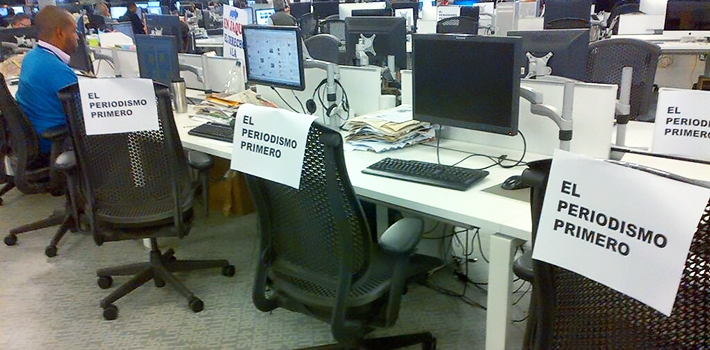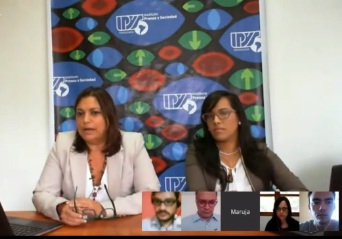
EspañolMedia censorship and self-censorship have intensified in Venezuela and are now commonplace in the South American nation, according to a Press and Society Institute (IPYS) report released on Monday. The institute’s study identifies the Venezuelan government as the primary censor of news media.
At least 79 percent of journalists surveyed said state institutions had denied them access to public information; 42 percent reported being pressured by public officials to alter their work in some way; and 44 percent had been forced to recant corroborated information after its publication, due to pressure from the government.
The results are part of an IPYS study called “The Order is Silence: Censorship and Self-Censorship among Journalists and Media in Venezuela.” The study is based on interviews with 225 journalists from private, community, state, and independent media outlets from the 13 most prominent Venezuelan states.
Marianela Balbi, the executive director of IPYS Venezuela, says one of the most concerning aspects of the study is that censorship orders are coming directly from the government. Of the surveyed journalists, 34 percent report receiving orders from the Venezuelan executive, followed by 17 percent from the judiciary, 14 percent from Congress, 7 percent from the Moral Council, and 6 percent from the National Electoral Council.
The study also documented direct censorship orders from private economic groups (16 percent); political organizations (8 percent); organized crime (6 percent); independent social groups (3 percent); and civil-society organizations (1 percent).

“The study reveals a type of censorship umbrella, that not only suppresses information and opinions, but also affects fundamental freedom of expression,” said Balbi in a press release. “This prohibits and criminalizes access to public information, judicial and administrative guarantees, and the general conditions necessary to conduct journalism.”
She believes the study should serve as a “wake-up call to demand answers, not only to preserve press freedom, but to guarantee the basic principles of democracy.”
Of the journalists surveyed, 93 percent support the passage of a Freedom of Information Act that would guarantee the constitutional mandate against state censorship of the media. “This [law] would be a tool that offers security to journalists when requesting information,” said Balbi.
The IPYS director also says the Venezuelan government has implemented ambiguous policies in this regard. She notes that while they have passed transparency laws like the Ley de Infogobierno, the government has also created institutions like the Special Brigade against the Actions of Violent Groups (BEGV) and the Strategic Center for the Security and Protection of the Homeland (CESPPA).
“The fundamental decrees of these organizations contain provisions that reduce transparency and restrict citizens right to access information that is in the public interest.”
Guardians of Silence
Beyond direct censorship orders, a policy of silence is one of the study’s primary findings. Almost four out of five journalists claim the state has denied them access to information that would have been in the public interest, while 32 percent say private institutions have done the same.
Venezuelan journalists also report having their journalistic activity impeded by non-state actors, including quasi-government and paramilitary groups (27 percent), organized crime groups (27 percent), and groups of violent protesters (23 percent).
Ronny Rodríguez, an IPYS representative in the state of Monagas, said this type of censorship eventually breeds self-censorship, as media outlets begin to fear government reprisal. He notes the example of medical clinics in Monagas, where medical officials refuse to provide information regarding the health situation in the region, such as the recent outbreak of chikungunya, because the government heavily restricts that sort of information.
First Censorship, then Self-Censorship
“At the end of the day, the goal of this type of pressure is to silence journalists,” said the report’s coordinator, Mariengracia Chirinos.
Balbi and Chirinos are particularly concerned that 29 percent of respondents said they have voluntarily decided not to publish information in the public interest for fear that their employer would not release it. She adds that 28 percent claim they censored themselves for fear of threats to their personal security and safety; 24 percent say they have engaged in self-censorship to protect a source or other individual, and 24 percent have self-censored for fear of being sued.
Journalistic Integrity Under Threat
With regard to journalists’ safety and security, 54 percent of respondents say they have experienced verbal or written threats; 47 percent have experienced acts of verbal or physical intimidation; 26 percent experienced violence from protesters; 19 percent reported physical aggression from individual citizens; and 13 percent say they suffered physical aggression from public officials.
Marianela Balbi explained that the combination of intimidation and censorship has diminished the prestige of the profession. She also contends the image of journalists as part of the Venezuelan sociopolitical conflict does not shield them from violence in the polarized country, and impedes their ability to serve a watchdog role.
Balbi said the new systems of state censorship ultimately prevents citizens’ access to timely information, impeding the development of democracy.
 Versión Español
Versión Español












